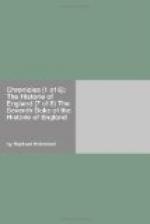The trespuissance of Cnute, the amplenesse of his dominions, the good and charitable fruits of his voiage to Rome redounding to the common benefit of all trauellers from England thither, with what great personages he had conference, and the honour that was doone him there, his intollerable pride in commanding the waters of the flouds not to rise, he humbleth himselfe and confesseth Christ Iesus to be king of kings, he refuseth to weare the crowne during his life, he reproueth a gentleman flatterer, his issue legitimate and illegitimate, his inclination in his latter yeares, what religious places he erected, repaired, and inriched; what notable men he fauoured and reuerenced, his lawes; and that in causes as well ecclesiasticall as temporall he had cheefe and sole gouernement in this land, whereby the popes vsurped title of vniuersall supremasie is impeached.
THE XIIJ. CHAPTER.
[Sidenote: The large dominion of K. Cnute. Hen. Hunt. Alb. Crantz.] This Cnute was the mightiest prince that euer reigned ouer the English people: for he had the souereigne rule ouer all Denmark, England, Norwaie, Scotland, and part of Sweiden. Amongest other of his roiall acts, he caused such tolles and tallages as were demanded of way-goers at bridges and streets in the high way betwixt England and Rome to be diminished to the halfes, and againe got also a moderation to be had in the paiment of the archbishops fees of his realme, which was leuied of them in the court of Rome when they should receiue their palles, as may appeare by a letter which he himselfe being at Rome, directed to the bishops and other of the nobles of England. In the which it also appeareth, that besides the roiall interteinment, which he had at Rome of pope Iohn, he had conference there with the emperour Conrad, with Rafe the king of Burgongne, and manie other great princes and noble men, which were present there at that time: all which at his [Sidenote: Grants made to the benefit of Englishmen, at the instance of king Cnute. Fabian. Polydor. Matt. West.] request, in fauour of those Englishmen that should trauell vnto Rome, granted (as we haue said) to diminish such duties as were gathered of passingers.
He receiued there manie great gifts of the emperour, and was highlie honored of him, and likewise of the pope, and of all other the high princes at that time present at Rome: so that when he came home (as some write) he did grow greatlie into pride, insomuch that being [Sidenote: He caused his chaire to be set there, as Matth. West. saith. Hen. Hunt.] neere to the Thames, or rather (as other write) vpon the sea strand, neere to Southhampton, and perceiuing the water to rise by reason of the tide, he cast off his gowne, and wrapping it round togither, threw it on the sands verie neere the increasing water, and sat him downe vpon it, speaking these or the like words to the sea: “Thou art (saith




